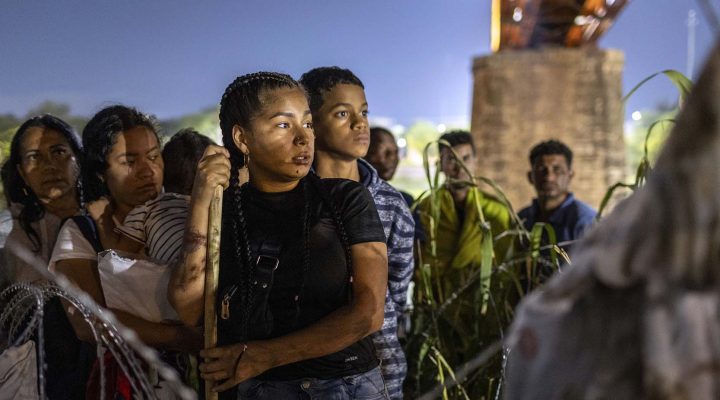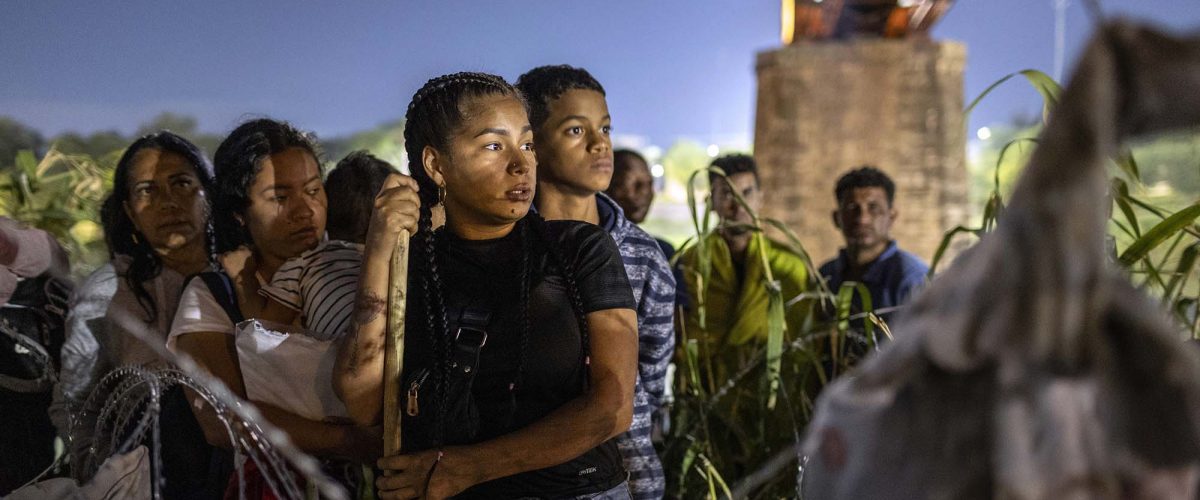White evangelicals outpace other Christian groups in assuming the worst about immigrants and immigration, Pew Research Center found in a new study.
The March 4 report also found Christians overall have more negative attitudes about immigration than those who claim no religious affiliation.
But white evangelicals were unmatched in their pessimism in assessing the challenges of migration, with 70% labeling the influx of migrants at the U.S.-Mexico border a “crisis” and 23% calling it a “major problem.”
White Catholics were next in line with 64% considering the border surge a crisis and 26% calling it a “major problem.” Most white nonevangelical Protestants (57%) consider the border situation a crisis compared to 24% who say it is a significant problem.
“Most Black Protestants and the religiously unaffiliated — people who describe themselves as atheist, agnostic or nothing in particular, and are often called ‘nones’ — also say the situation at the border is at least a major problem,” Pew reported. “Compared with white Christians, however, smaller shares of Black Protestants and religiously unaffiliated adults say the situation at the border is a crisis.”
Pew found 32% of Black Protestants and 27% of nones describe the border situation as a crisis, while 39% of Black Protestants and 42% of respondents with no religious affiliation agreed it’s a major problem. Figures for Hispanic Catholics were unavailable on that question.
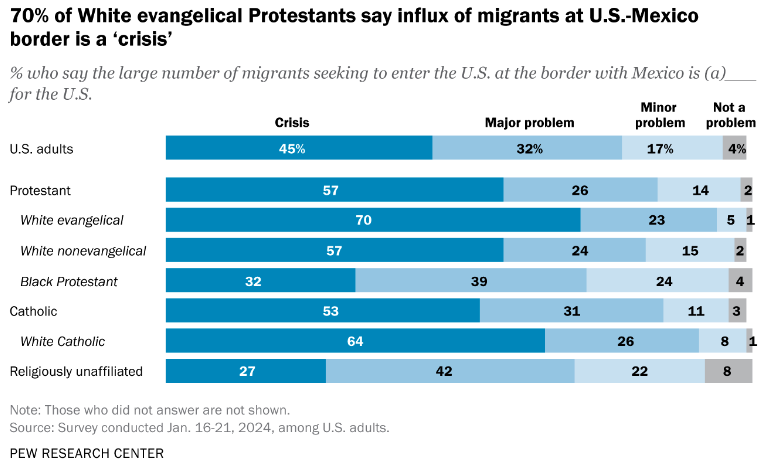
Overall, 57% of all Protestants view the current number of migrants as a crisis, as do 53% of all Catholics, while only 45% of U.S. adults share that opinion.
Respondents were divided when asked to select explanations for the causes of migration at the southern border. They could choose from good economic conditions in the U.S., violence in their home nations, and migrants’ belief that it is easy to remain in the U.S. after arrival.
A majority of adults, and majorities of the faith groups tracked in the survey, said economic conditions are a major driver of current migration trends.
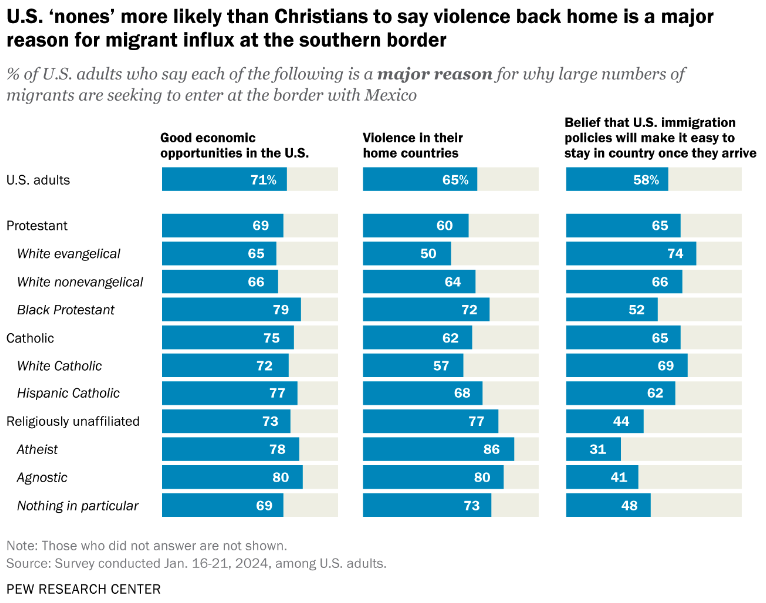
“However, white evangelical Protestants are less likely than other religious groups to say that escaping violence in their home countries is a major reason why migrants come to the U.S. And they are more likely than most other groups to say that migrants come because they believe that U.S. immigration policies will make it easy for them to stay once they arrive,” Pew reported.
White evangelicals stood out on the question, with 65% attributing the migration wave to economic opportunity in the U.S., 74% saying migrants think it’s easy to remain in the U.S. and only 50% agreeing that violence in countries of origin is a major reason for migration.
The assessment is reversed in other faith groups: 57% of white Catholics, 64% of white nonevangelicals, 68% of Hispanic Catholics and 72% of Black Protestants consider violence to be a major driver of migration patterns. Across faith groups, 60% of Protestants and 62% of Catholics see violence as a major cause of migration trends.
By comparison, 77% of nones say violence is a significant factor, including, 86% of atheists, 80% of agnostics and 73% of “nothing in particular.”
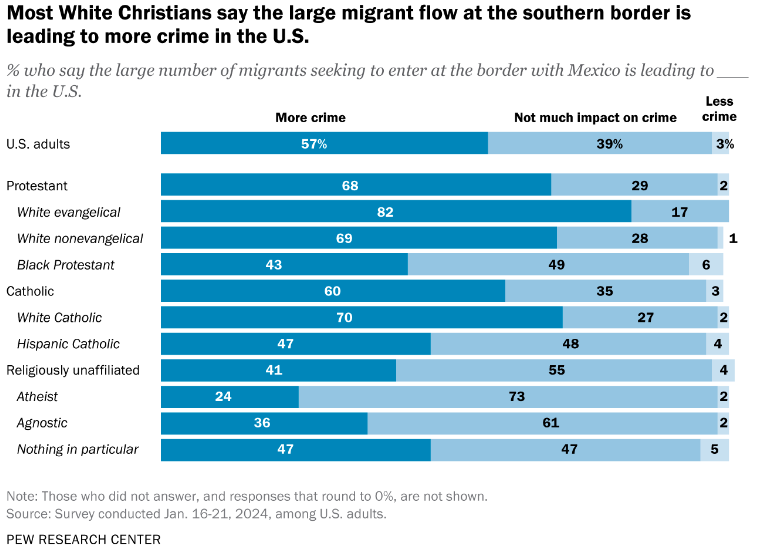
White evangelicals (82%) led all categories in saying migration at the southern border leads to higher crime rates in the U.S., followed by 70% of white Catholics, 69% of white nonevangelicals, 47% of Hispanic Catholics and 43% of Black Protestants.
Religiously unaffiliated respondents (41%) were the least likely to see a connection between migration and crime, including 47% of “nothing in particular,” 36% of agnostics and 24% of atheists.
“The differences between religious groups on many of these questions are in line with broader divisions between Republicans and Democrats,” the report explains. “White Christians — especially white evangelical Protestants, but also white Catholics and white nonevangelical Protestants — mostly vote for Republican candidates. And far more Republicans than Democrats view the situation as a crisis and say the migrant surge leads to increased crime.”
“The differences between religious groups on many of these questions are in line with broader divisions between Republicans and Democrats”
But other research suggests being religiously conservative does not indicate a lack of support for immigration policies that are fair and compassionate to migrants and refugees.
A recently published study by Lifeway Research found 91% of U.S. evangelicals favor polices that “secure the nation’s borders while respecting the God-given dignity of every person.” The same percentage want the authorities to protect the unity of migrants’ families.
The survey, which was commissioned by the Evangelical Immigration Table, documented a connection between individual and church interactions with migrants and refugees and support for laws that treat migrants humanely.
A December survey by the National Immigration Forum and the Bullfinch Group reported strong voter support for legislators to work across party lines to bring about common-sense immigration reforms.
“By nearly 80 percentage points, registered voters say they would support a candidate who works to bring order to the border and enact bipartisan immigration reforms that address labor needs, inflation, and existing foreign-born workers,” the Forum reported.
“Overall support among registered voters was 86%, with 8% opposed and the rest saying they were unsure. Support was 86% among self-identified Republicans, 84% from those who identified themselves as conservative, and 85% from evangelical Protestants.”

